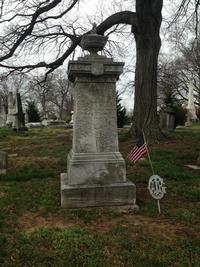#OneBookWednesday: Civil War Ladies of Philadelphia’s Own Laurel Hill
By Alix G.On a chilly Sunday afternoon, about 25 people—kids, college students, seniors—all packed into the cozy Gatehouse at Philadelphia’s famed Laurel Hill Cemetery for a discussion of “Laurel Hill’s Legendary Ladies of the Civil War Era,” a program presented in partnership with our very own One Book, One Philadelphia.
Elizabeth E. Hutter, a “permanent resident” of Laurel Hill since 1895 (okay, okay, really just a terrific speaker/tour guide clad in Civil War-era duds!) served as our expert guide and used a “magic lantern” (okay, okay, really just PowerPoint) to walk us figuratively through the cemetery, stopping at the graves of Philadelphia women who had played various and sundry roles in the war. Along the way, Mrs. Hutter asked participants to consider the struggles of Cold Mountain characters Ada and Ruby as we learned about the struggles of their northern counterparts. We learned about women of Philadelphia who served as nurses, who worked at and fundraised for Philadelphia’s sanitary fares, who founded orphanages, who wrote editorials, and who... created naval signal flares?
That last one surprised me. Martha Jane Coston (1826-1904) was left a widow at age 21, with a brood of young kids to take care of. Desperate to find financial solvency, she went through her husband’s—an inventor—papers, hoping to find an idea to run with and, ultimately, monetize. As luck would have it, she located some very preliminary documents about maritime signal flares and a corresponding system of codes, which sailors could use to communicate with each other or those on land. She fully explored and developed the system, filed a patent (albeit under her husband’s name, as she was told a scientific patent by a woman would not be taken seriously), and marched off to sell the concept. When her own country balked, others saw its ingenuity, and soon Great Britain, Italy, France, the Netherlands, and Denmark were all using Coston Flares. As the Civil War broke out, the United States finally realized the value of the flare system, and Martha patriotically sold them at cost to the Union forces. She continued perfecting her system after the war—Coston-type flares are still used today—and filed a second, updated patent—this time under her own name.
The women we learned about who are buried in Laurel Hill were all brave, patriotic, creative, and benevolent. They were also all white. As the lecture wound to a close, someone in the audience raised a hand, and asked what was surely on all of our minds: “Aren’t any women of color from the Civil War era buried here?”
The answer was no. Not until a lawsuit in the latter half of the 20th century were African Americans allowed to be buried at Laurel Hill. It was a poignant reminder that slavery, racism, and the Civil War cast very long shadows on both sides of the Mason Dixon line, and even in our own city. And so as Cold Mountain asks us to mainly contemplate the struggles of white women, like the fictional Ada and Ruby, during the Civil War, we do ourselves a disservice if we don’t remember their sisters of color—enslaved and free—whose names might not be fictionalized in novels, written down in history books, or memorialized on gravestones laden with flowers.
The study of our collective past must be that—collective. Laurel Hill Cemetery is candid about its past of exclusion, which is important to our understanding. When we study history without inclusivity we render a fictionalized version of the past, which leads to a dangerous misunderstanding of the present. This One Book season—which is now coming to a close—has proven a great launchpad for our communities and our city to grapple with these difficult questions.
Join us for the One Book, One Philadelphia Grand Finale TONIGHT, Wednesday, March 30, at 7:30 p.m. in Parkway Central's Montgomery Auditorium.
Have a question for Free Library staff? Please submit it to our Ask a Librarian page and receive a response within two business days.

